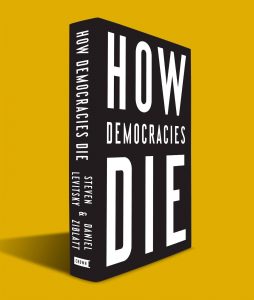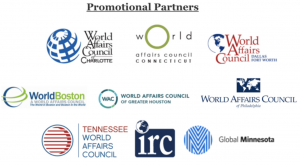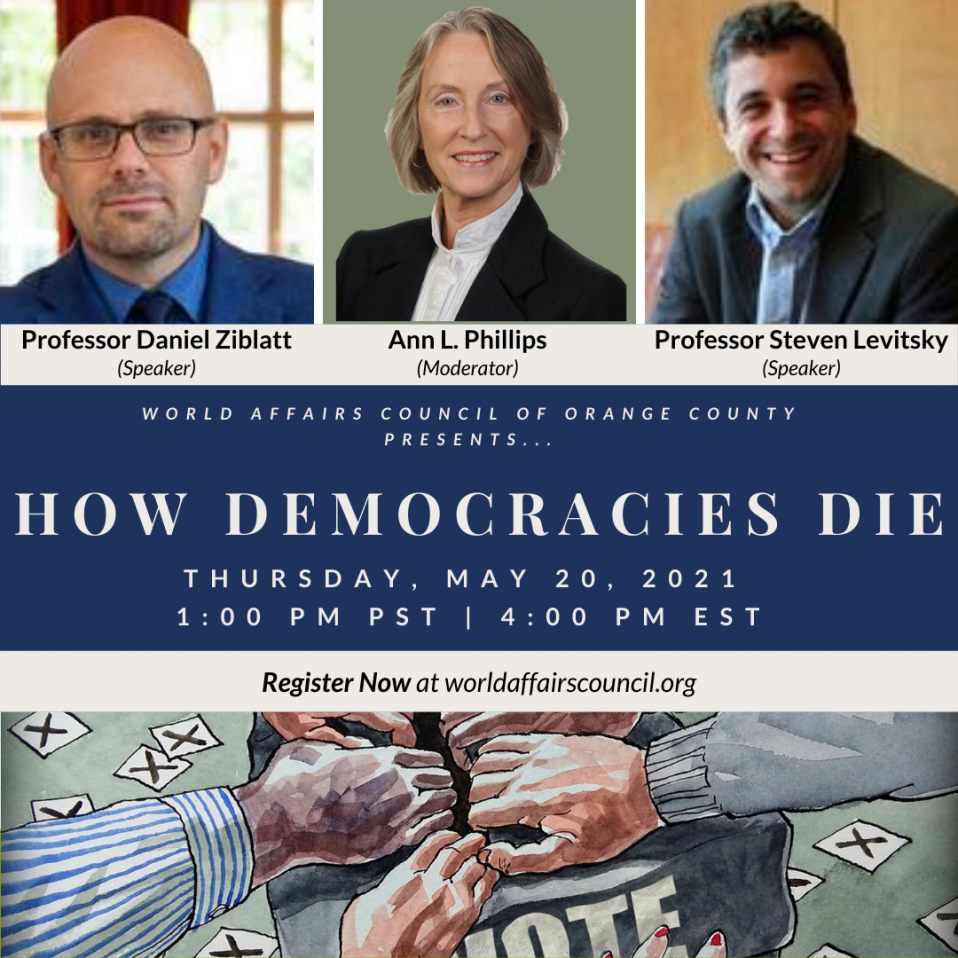Thursday, May 20, 2021 @ 1:00 PM PST | 4:00 PM EST
The World Affairs Council of Orange County Presents:


NEW YORK TIMES BESTSELLER • “Comprehensive, enlightening, and terrifyingly timely.”—The New York Times Book Review (Editors’ Choice)
WINNER OF THE GOLDSMITH BOOK PRIZE • SHORTLISTED FOR the LIONEL GELBER PRIZE • NAMED ONE OF THE BEST BOOKS OF THE YEAR BY
The Washington Post • Time • Foreign Affairs • WBUR • Paste
Praise for How Democracies Die
How Democracies Die: What History Reveals About Our Future
“If you only read one book for the rest of the year, read How Democracies Die. . .This is not a book for just Democrats or Republicans. It is a book for all Americans. It is nonpartisan. It is fact based. It is deeply rooted in history. . . The best commentary on our politics, no contest.”—Michael Morrell, former Acting Director of the Central Intelligence Agency (via Twitter)
“A smart and deeply informed book about the ways in which democracy is being undermined in dozens of countries around the world, and in ways that are perfectly legal.”—
Fareed Zakaria, GPS, CNN
“Two years ago, a book like this could not have been written: two leading political scientists who are expert in the breakdown of democracy in other parts of the world using that knowledge to inform Americans of the dangers their democracy faces today. We owe the authors a debt of thanks for bringing their deep understanding to bear on the central political issue of the day.” —Francis Fukuyama, John’s Hopkins SAIA and author of Political Order and Political Decay.
Daniel Ziblatt is Eaton Professor of the Science of Government at Harvard University and resident faculty at the Minda de Gunzburg Center for European Studies (CES). At CES, he co-chairs the Seminar on Democracy – Past, Present, Future.
Ziblatt specializes in the study of European politics, state-building, democratization, and historical political economy. His latest book How Democracies Die (co-authored with Steven Levitsky) was on the New York Times bestseller list and has been translated into 22 languages.
His second book Conservative Parties and the Birth of Democracy (2017) offers a new interpretation of the historical democratization of Europe, drawing lessons for new and old democracies under siege today. His book Structuring the State: The Formation of Italy and Germany and the Puzzle of Federalism (2006) draws lessons from nineteenth century experiences of state-building in Italy and Germany.In recent years he has been a fellow or visiting professor at the European University Institute (Florence, Italy), Center for Advanced Study (Stanford), Max Planck Institute (Cologne), University of Munich, and the Ecole Normale Superieure (Paris).
Steve Levitsky is a professor of government at Harvard University and coauthor of the 2018 New York Times bestseller How Democracies Die, with Daniel Ziblatt. In it, they argue that democracies die not because of revolutions or military coups, but due to the slow weakening of critical institutions and the gradual erosion of political norms.
Levitsky is a former Kellogg visiting fellow and an expert on Latin American politics. His research interests include political parties, authoritarianism and democratization, and weak and informal institutions. He is researching the durability of revolutionary regimes, the relationship between populism and competitive authoritarianism, problems of party-building in contemporary Latin America, and party collapse and its consequences for democracy in Peru.
He is co-author, with former Kellogg Visiting Fellow Lucan Way, of Competitive Authoritarianism: Hybrid Regimes after the Cold War (2010); author of Transforming Labor-Based Parties in Latin America: Argentine Peronism in Comparative Perspective (2003); and co-editor of The Resurgence of the Left in Latin America (2011), Informal Institutions and Democracy: Lessons from Latin America (2006), and Argentine Democracy: The Politics of Institutional Weakness (2005).
He has contributed to a number of Kellogg Working Paper Series and to volumes resulting from Kellogg conferences, including Party Systems in Latin America: Institutionalization, Decay and Collapse, edited by Scott Mainwaring, former director of the Kellogg Institute (Cambridge University Press, 2018).
Ann L. Phillips is the senior advisor to the Nagorno-Karabakh Project, part of the Inclusive Peace Processes program at USIP. In addition to ongoing research and writing, she has drafted a conflict assessment, helped develop the workshop agenda for journalists from the region, and worked on other options for engagement.
Previously, she was senior advisor to USIP’s civilian-military relations program, which focused on improving the effectiveness of civilian and military actors working in the same conflict-affected or fragile state. In addition, she co-led workshops in the ACOTA program for African Union peacekeepers and led the governance module for the Ministry of Defense Advisory program for U.S. advisors detailed to foreign countries.
From 2007 until 2011, Phillips developed and directed the Program for Security, Stability, Transition & Reconstruction at the George C. Marshall European Center for Security Studies in Garmisch-Partenkirchen, Germany. Before that, she was a senior political economist in the Policy and Program Coordination Bureau at USAID and was detailed to the Office of the Director of Foreign Assistance, Department of State, as a senior policy analyst and country team leader between 2006-2007.
Prior to joining the government, Phillips was a faculty member at American University and Smith College; Fulbright professor at the Friedrich Schiller Universität; and guest professor at the University of Rostock. She earned a doctorate from Georgetown University in international relations and comparative politics with a regional concentration on the former Soviet Union and Eastern Europe, as well as a master’s in international relations from Johns Hopkins University.


